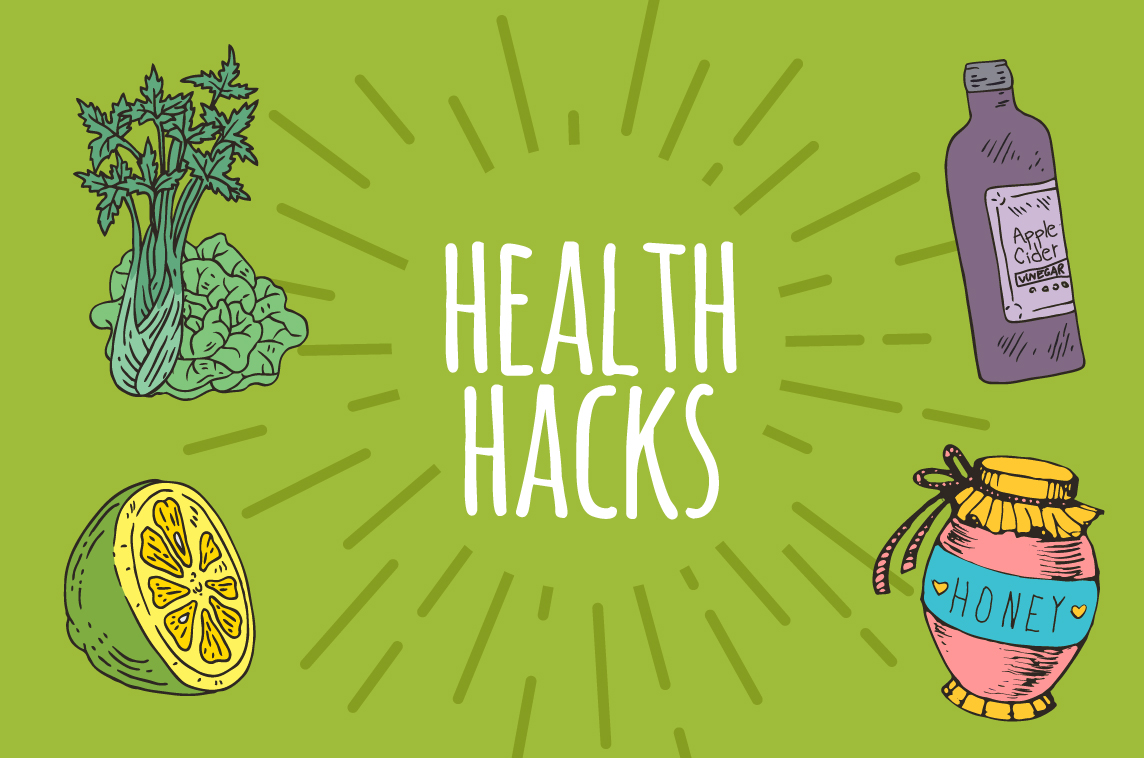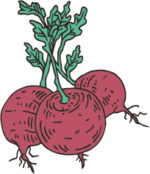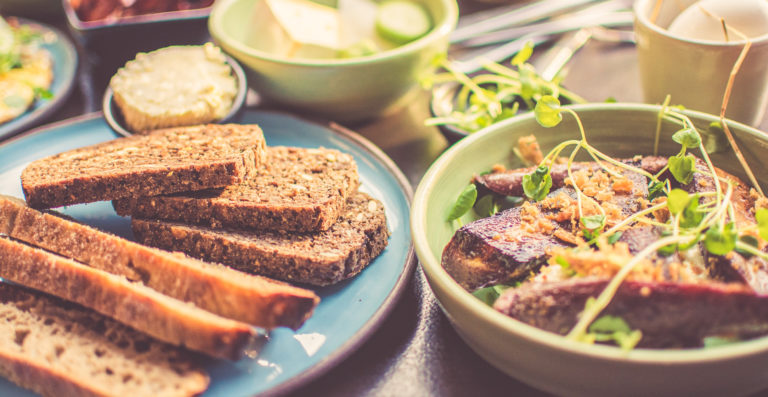
Have you ever said “I want to be healthier”? It’s a pretty generic statement, but if you want some help in achieving it, these 5 health hacks are a good place to start. They’ll help you to eat more veggies, get more exercise, improve your digestion, get more calcium, and make more nutritious cookies! Overall, you’ll be healthier.
The Veggie Un-Taster
 I dislike many veggies, but since I know how good they are for me I add them to a smoothie; masking the taste with yogurt, bananas, and a bit of pure maple syrup. Throwing in some frozen fruit chunks helps too. Alternatively, I sometimes juice the veggies I hate (like celery and beet), and mix them in a juice with ginger and lemon, which help to mask the taste. This is a great way for kids to get their veggies too. Experiment with difference combinations and see what works. Generally, taking your favorite strong tasting foods and mixing them with smaller amounts of the less awesome tasting veggies will give you a good mix of nutrition and flavor.
I dislike many veggies, but since I know how good they are for me I add them to a smoothie; masking the taste with yogurt, bananas, and a bit of pure maple syrup. Throwing in some frozen fruit chunks helps too. Alternatively, I sometimes juice the veggies I hate (like celery and beet), and mix them in a juice with ginger and lemon, which help to mask the taste. This is a great way for kids to get their veggies too. Experiment with difference combinations and see what works. Generally, taking your favorite strong tasting foods and mixing them with smaller amounts of the less awesome tasting veggies will give you a good mix of nutrition and flavor.
The Exerciser
Hate Exercise? Despise Going to the Gym? Or maybe you just don’t have time to hit the gym on a regular basis. How about instead, you space out your exercise through the day and associate each move with a task you do everyday. It generally won’t get your heart rate up really high, but doing small, quick exercises throughout the day will still have a positive impact on your overall health and your muscles. For instance, every time you start the dishwasher, do 10 squats. After you use the bathroom, do 10 ankle lifts. Each time you turn the oven on to preheat, do 10 jumping jacks. When brushing your teeth, straighten your leg and swing it behind or to the side, 10 times each leg. Pretty quickly you’ll feel it in your muscles, and the quicker you get at each exercise, the more reps you can add to each.
The Delicious Digester
Have you ever heard of the Master Cleanse? It’s a concoction of hot water, maple syrup, cayenne pepper, and freshly squeezed lemon juice. But this isn’t about doing a cleanse. A variation of this drink happens to be an amazing tool for getting your digestive juices going. The mix is: Hot water, 2 Tbsp fresh lemon juice, a pinch of cayenne pepper, and a little ginger (The proportions can be varied depending on your tastes). If you want it a bit sweeter, add in some honey, pure maple syrup, or molasses. Drink this first thing in the morning before breakfast when you need some extra help to clean out toxins. Lemon, cayenne, and ginger are mild stomach stimulants, so they stimulate the stomach to produce a lot of digestive juice. This drink doesn’t require much digestion, so there is a surplus of digestive energy that goes out into the blood and helps to clear toxins from the body.
Source: Eating Alive: Prevention Thru Good Digestion
The Calcium Absorber
Squeeze a bit of lemon or add some vinegar, like apple cider or balsamic, over a green, leafy salad. Dark leafy greens are high in calcium and calcium is best absorbed in an acid medium. This is a really great tip if you’re a woman nearing/in your menopausal years, as your body needs the extra calcium during that time.
Source: Staying Healthy with Nutrition
The Sugar Replacer
 In recipes calling for ordinary white sugar (Basically, every recipe ever) you can replace the sugar with uncooked, unfiltered raw honey. Use 1/2 a cup of honey for every 1 cup of sugar the recipe calls for. Then just reduce the amount of liquid the recipe calls for by 1/4 cup; or if the recipe doesn’t call for any liquid ingredients, just add 3 tablespoons of flour.
In recipes calling for ordinary white sugar (Basically, every recipe ever) you can replace the sugar with uncooked, unfiltered raw honey. Use 1/2 a cup of honey for every 1 cup of sugar the recipe calls for. Then just reduce the amount of liquid the recipe calls for by 1/4 cup; or if the recipe doesn’t call for any liquid ingredients, just add 3 tablespoons of flour.
Source: Prescription for Dietary Wellness
SOURCES
Eating Alive: Prevention Thru Good Digestion
Jonn Matsen – Jeanne Martin – Nelson Dewey – Crompton Books – 1988
Prescription for Dietary Wellness
Phyllis Balch – James Balch – Avery Pub. Group – 1998
Elson Haas, Buck Levin. Staying Healthy with Nutrition.
New York: TenSpeed Press, 2006. Print.
DISCLAIMER
The contents of this website are for informational purposes only and should not be considered any type of medical advice. The information provided in this website should not be used for diagnosing or treating a health condition or disease, and should not be substituted for professional care. Every human is biochemically different and what works for one person may not work for another. If you suspect or have a medical condition, consult an appropriate health care provider.










Leave a Comment